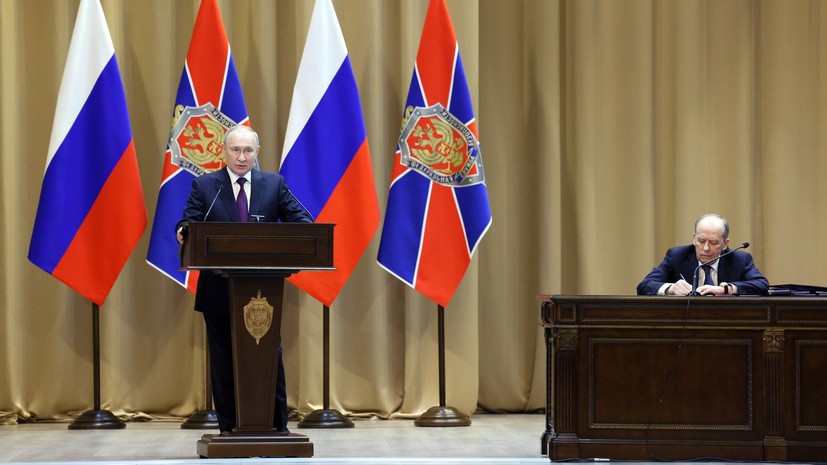Vladimir Putin called on the Border Service of the Federal Security Service (FSB) to keep the Russian-Ukrainian section of the state border under special control.
The president spoke about this during a meeting of the expanded collegium of the FSB of the Russian Federation.
“Now a group is deployed there, which includes units of the border authorities, aviation of the FSB, the Armed Forces and the National Guard.
Your task is to put a barrier in the way of sabotage groups, to stop attempts to illegally transport weapons and ammunition into Russia, ”Putin said.
He also noted that it is necessary to more clearly debug the system for the passage of refugees across the border, as well as military convoys, military equipment, humanitarian and construction cargo.
The President also spoke about the work of Western intelligence agencies against Russia.
According to him, now additional personnel, technical and other resources have been thrown into this direction.
Putin also called for reliable protection of significant information about Russian control systems, military and law enforcement structures, defense industry enterprises, critical technologies and personal data, as well as information about the latest Russian weapons and equipment.
Opening remarks by Vladimir Putin at a meeting of the FSB Board
In addition, the President noted, the task of countering the threat of terrorism is still relevant.
The head of state linked the growth of such crimes with Ukraine's attempts to use the terrorist methods that were used by Kiev in the Donbass, as well as with the desire of the West to "reanimate" the cells of extremists and terrorists.
“We know that they never disdain to use both radicals and extremists in their interests, despite all the loud statements about the fight against international terrorism.
They always use what is at hand against us, what is possible, and then they use it, ”Putin said.
The President urged to effectively respond to these challenges together with law enforcement agencies and under the coordination of the National Anti-Terrorism Committee (NAC).
He also stressed that it is necessary to constantly keep in sight objects of critical infrastructure, places of mass stay of people, transport hubs, enterprises of the military-industrial complex and the fuel and energy complex.
Among other things, the President called for the development of regional segments of the nationwide system of countering terrorism, including in the Donetsk and Lugansk People's Republics, Zaporozhye and Kherson regions.
In addition, the President spoke about the work to identify and stop the actions of those who use the Internet and social networks to promote the ideology of terrorism and extremism, especially among young people.
He also called for the identification and suppression of the illegal activities of those who are trying to split and weaken Russian society, in particular, using separatism, nationalism, neo-Nazism and xenophobia as weapons.
“This has also always been applied to our country, and now, of course, the most active attempts are attempts to activate all this scum on our land,” the president concluded.
At the same time, the head of state expressed confidence that the Russian special services and security agencies would be able to adequately solve the tasks facing them.
NAC - about work in 2022
Last December, the results of work for 2022 were summed up at the National Anti-Terrorism Committee.
According to the chairman of the NAC, Alexander Bortnikov, in 2022 the number of terrorist manifestations has significantly increased, primarily in the border regions located in the Central and Southern federal districts.
He linked this dynamic with the intelligence and subversive activities of the Ukrainian special services, carried out with the support of Western countries, as well as with attempts to create clandestine cells by supporters of international terrorist organizations.
According to the committee, in 2022, 123 terrorist crimes were prevented at the preparation stage, including 64 terrorist attacks, and the activities of 68 clandestine cells of international terrorist organizations were suppressed.
In addition, more than 400 Ukrainian nationalists and persons who committed war crimes were detained at checkpoints while trying to cross the state border.

